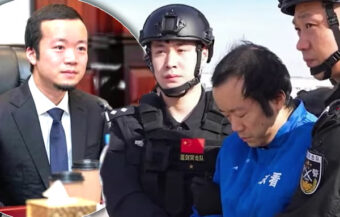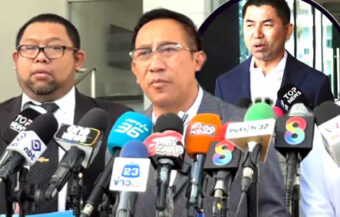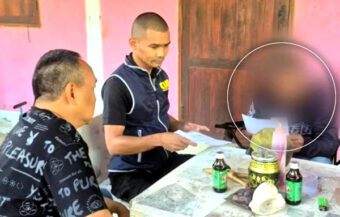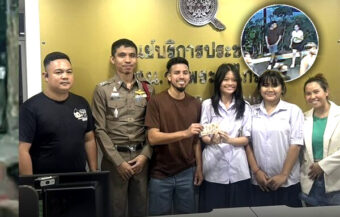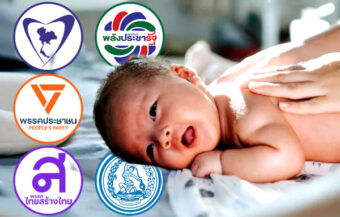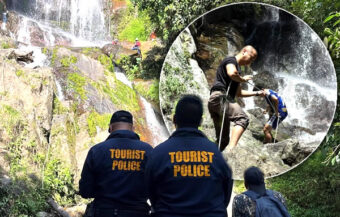Belarusian model Vera Kravtsova travelled through Thailand before being murdered in Myanmar, her organs sold by a Chinese-led scam gang. Thai police confirm she passed through Suvarnabhumi Airport alone and was not abducted on Thai soil.
The Royal Thai Police Immigration Bureau confirmed that 26-year-old Belarusian Vera Kravtsova arrived in Thailand on September 14 and left for Yangon on September 20 via Suvarnabhumi Airport. Reports suggest she was later murdered and her organs sold by a Chinese-led scam operation in northern Myanmar. Pol. Maj. Gen. Choengron Rimpadee said airport footage shows her moving of her own accord, and the police are satisfied she was not abducted on Thai soil.

Thai authorities are still urgently investigating the disappearance and death of 26-year-old Belarusian woman Vera Kravtsova. The Belarusian model is believed to have been murdered by a Chinese-controlled scam compound in northern Myanmar in recent weeks, with her organs harvested and sold on.
The Royal Thai Police have confirmed several key details circulating in European and Asian media, highlighting a disturbing pattern of transnational crime.
According to the Immigration Bureau, Ms. Kravtsova entered Thailand on September 14 at Suvarnabhumi Airport. Police have obtained records documenting both her arrival and departure. These have been forwarded to investigators in Belarus for further verification.
Belarusian woman Vera Kravtsova left Thailand for Yangon, according to Thai police without visible coercion
Significantly, authorities confirmed that Ms. Kravtsova departed Thailand on September 20, flying to Yangon, Myanmar’s commercial capital. She travelled on Thai Airways flight TG 301, departing from Suvarnabhumi Airport. Pol. Maj. Gen. Choengron Rimpadee emphasised she was alone and did not show signs of coercion or physical restraint during transit.
Initial reports highlighted the circuitous route she took to Thailand. Observers suggested traffickers may have advised her on how to reach their criminal headquarters in northern Myanmar. The implications suggest a sophisticated network exploiting unsuspecting young women.
Sources in Yangon suggested that Ms. Kravtsova reached a scam centre where she was enslaved and later murdered. According to multiple reports, her organs were sold by the operators. These centres are linked to a wider network across Myanmar, Laos, and Cambodia, allegedly controlled by the Chinese mafia.
In Bangkok, part of this organisation’s profits is reportedly laundered through legitimate businesses. Prime Minister Anutin Charnvirakul acknowledged these operations on Monday but did not name names. The case has also drawn attention to Thailand’s vulnerability as a regional hub for human trafficking.
Media coverage warns Thailand’s tourism could suffer while officials confirm Kravtsova travelled alone
Media coverage in Eastern Europe has amplified the story. Presently, industry sources are warning that Thailand’s tourism prospects may suffer through late 2025 and into 2026. Analysts note that the region has repeatedly experienced cases of foreign victims being trafficked into scam operations.
Thai officials have denied that Ms. Kravtsova was “forced” to travel to Myanmar. Investigations determined she passed through Suvarnabhumi Airport’s automated immigration channel alone. CCTV footage showed no visible signs of coercion or pressure. Pol. Maj. Gen. Choengron stressed that the brutal acts occurred outside Thailand’s jurisdiction.
The Immigration Bureau provided evidence of Ms. Kravtsova’s entry and exit to the Belarusian consulate. Pol. Maj. Gen. Choengron also noted that authorities actively screen foreigners to prevent them from falling into scam networks. So far this year, approximately 34,000 individuals have been denied entry to Thailand.
Reports indicate that Ms. Kravtsova’s journey began in Minsk, then St. Petersburg, passing through Vietnam, China and Indonesia before arriving in Bangkok. She was recruited through a job offer promising modelling work. Her family claims she was subsequently trafficked into a northern Myanmar scam compound, enslaved and ultimately murdered.
Kravtsova’s journey spanned multiple countries before trafficking and murder in northern Myanmar compound
Ransom demands of $500,000 were reportedly sent to the family, seeking the return of her remains. When they refused, the gang stated her body had been cremated. Later messages claimed her organs had been removed before cremation.
The Belarusian government confirmed the incident and is providing diplomatic assistance. Ms. Kravtsova’s mother reportedly negotiated with the traffickers, who eventually agreed to return her daughter’s ashes without further ransom. Belarusian officials continue working with Thai and Myanmar authorities to verify all claims and track the young woman’s movements.
Thai police Major General Chaturaphat Piromkaew said the investigation is a top priority. National Police Chief General Kittirat Phanphet has personally ordered urgent action. Authorities are coordinating closely with Myanmar security agencies and the Ministry of Foreign Affairs to verify details.
More than 120,000 people are trapped in Myanmar scam compounds under brutal and exploitative conditions
International reports suggest that more than 120,000 people are trapped in scam compounds across Myanmar. Victims include citizens of Vietnam, India, Sri Lanka, Russia, and other Eastern European countries. Many are forced to perform online scams, working long hours under constant threat.
Survivors report electrified fences, armed guards, and total isolation. They describe being forced into romance scams, cryptocurrency fraud, or other cyber crimes. Those who fail to generate profit are beaten, tortured, or sold to other operators. Escape is nearly impossible.
Human rights groups warn that Kravtsova’s case reflects a regional crisis in human trafficking. Scam centres are operated like industrial businesses, mixing cybercrime, slavery and organ trafficking. Corruption and armed militias allow these operations to persist with little enforcement.
Criminal networks reportedly launder money through legitimate businesses in Thailand, Cambodia, and Laos. Recent cross-border operations in Thailand rescued victims from Cambodian gangs. Authorities freed dozens, including women promised hotel jobs abroad, highlighting the scope of the trafficking network.
Chinese-led criminal organisations run scam networks laundering billions while abusing trafficked victims
Chinese criminal organisations are believed to coordinate much of this activity. Investigations by the FBI and British authorities targeted the Prince Group, which allegedly launders scam proceeds. Authorities seized about ฿500 billion in property and cryptocurrency. Leaders deny wrongdoing, but investigations continue.
Former victims describe recruitment through glamorous job offers abroad. They recount being forced into online scams, experiencing daily beatings and threats. Noncompliance often results in organ harvesting or death. Such accounts illustrate the brutal nature of these transnational operations.
Thai officials urge citizens to verify foreign job offers. Major General Chaturaphat emphasised the importance of public awareness to prevent recruitment into fraudulent schemes. Authorities have strengthened screening at airports to stop Thailand from being used as a trafficking hub.
Cases highlight Southeast Asia’s persistent trafficking and cybercrime networks exploiting victims
Earlier cases show the scale of the problem. Russian model Dashinima Ochirnimayeva, 24, reported being trafficked to Myanmar and forced into cybercrime before escaping. She described physical abuse, threats, and harsh working conditions. Her testimony highlights the persistence of these networks across Southeast Asia.
Traffickers exploit weak borders and law enforcement gaps to operate transnationally. They combine human trafficking, online fraud, and organ harvesting into a profitable system. Corruption and conflict make law enforcement difficult, allowing operations to expand across multiple countries.
Governments are under growing pressure to respond. Western nations have frozen assets and sanctioned companies linked to scam operations. United Nations reports describe Cambodia’s economy as increasingly dependent on these criminal enterprises, making them among the largest organised crime systems globally.
Thai authorities continue rescues and warn job seekers about trafficking networks across Southeast Asia
Thai law enforcement continues cross-border operations to protect victims. Recent rescues in Sa Kaeo Province freed eleven people, four of whom were women promised legitimate employment abroad. Authorities stress that international cooperation is essential to dismantle these networks.
Human rights advocates call for public education and preventive measures. Job seekers should verify recruiters, contracts, and the legitimacy of overseas employment. Governments must strengthen border controls and intelligence sharing to combat transnational trafficking. Accurate information is crucial to prevent misinformation from hindering investigations.
The Kravtsova case has renewed awareness of trafficking in Southeast Asia. Families of victims demand justice and transparency. Authorities highlight the need for accountability, while human trafficking, forced labour, and organ harvesting remain deeply interconnected crimes. Experts warn that unless governments act decisively, thousands more victims may vanish. The networks stretch from Thailand to Cambodia, Laos, Myanmar, China, and beyond. Vigilance, coordination, and enforcement are required to prevent further tragedies.
Vera Kravtsova’s death highlights trafficking dangers and exposes weaknesses in cross-border law enforcement
Vera Kravtsova’s story is a stark warning about the dangers of false promises abroad. It demonstrates the sophisticated methods traffickers use to exploit vulnerable individuals. Her death also exposes weaknesses in law enforcement across borders.
Thai authorities pledge continued cooperation with international partners. Police will release verified information once investigations confirm the facts. Belarusian officials are pressing for clarity and assisting the family. Meanwhile, the public is warned to exercise extreme caution regarding overseas job offers.
Police racing to verify disturbing reports of Belarusian model alleged to have been taken by scammers
Horror story of a Belarusian woman taken in Bangkok by Burmese scam compound gang being investigated
Cambodian scam, centre bosses target young Thai nationals seeking better pay due to the poor economy
The case has shocked the region and revived memories of earlier trafficking incidents. Victims from Thailand, China, and other countries have been deceived into scam compounds. Inside sources stress that human trafficking, cybercrime, and organ harvesting are interlinked and highly profitable.
Kravtsova’s tragic death highlights the dangers posed by criminal networks operating across borders. It brings home the urgency for coordinated government action, international cooperation and preventive education to save lives. Unless Western and Southeast Asian governments act decisively, traffickers will continue exploiting vulnerable young people. The networks are vast, complex and growing. This makes public awareness and strict enforcement critical. Vera Kravtsova’s case is a warning that the threat is real, deadly and immediate.
Significantly, it brings home the dangers posed by rogue governments in Myanmar and Cambodia.
In turn, this will gradually begin to question the ASEAN community’s policy of non-interference in the internal affairs of member states. It is also, given the existence of detailed United Nations reports, an international matter that needs to be elevated and cries out for justice. Justice for this young woman and many more like her.
Join the Thai News forum, follow Thai Examiner on Facebook here
Receive all our stories as they come out on Telegram here
Follow Thai Examiner here
Further reading:
Horror story of Belarusian woman taken in Bangkok by Burmese scam compound gang being investigated
Cambodian scam, centre bosses target young Thai nationals seeking better pay due to the poor economy
United States, South Korea and United Kingdom act against Cambodian scam industry with Thai tie-ins
Ben Smith affair & allegations of links to Cambodian scam centres continues to rage in parliament
Defiant Rangsiman Rome warns he’s not just fighting a defamation case but for the future of Thailand
Ben Smith money fixer to the elite in Thailand lines up ฿100M defamation case against Rangsiman Rome
Leader of deadly scam gang in Cambodia and henchmen still at large following 4 more arrests









